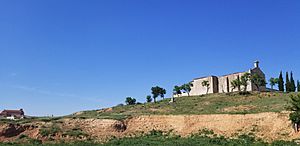Nava de Roa facts for kids
Quick facts for kids
Nava de Roa
|
|
|---|---|
| Country | Spain |
| Autonomous community | |
| Province | |
| Comarca | Ribera del Duero |
| Area | |
| • Total | 22 km2 (8 sq mi) |
| Elevation | 794 m (2,605 ft) |
| Population
(2018)
|
|
| • Total | 224 |
| • Density | 10.18/km2 (26.4/sq mi) |
| Time zone | UTC+1 (CET) |
| • Summer (DST) | UTC+2 (CEST) |
| Postal code |
09318
|
| Website | http://www.navaderoa.es/ |
Nava de Roa is a small town and municipality in Spain. It is located in the province of Burgos, which is part of the Castile and León region. This charming place is about 92 kilometers (57 miles) from the city of Burgos.
In 2004, about 246 people lived here. The name "Nava" comes from an old language and means "flat land surrounded by hills." Nava de Roa is especially famous for its delicious wines. These wines have a special quality mark called "Designation of Origin Ribera del Duero."
Contents
What's in a Name?
The name "Nava" has a very old history. It comes from a language spoken before the Romans arrived in Spain. It means "flat land surrounded by hills." This name perfectly describes the area where the town is located.
Historic Buildings and Art
Nava de Roa has many important old buildings, especially churches and chapels. They show off the town's rich history and beautiful art.
The Church of San Antolín Mártir
The main church in Nava de Roa is called San Antolín Mártir. It was first built in the 1600s and then made even bigger in the 1700s. The front of the church has a fancy style called Baroque. Its tower is in a newer style called Neoclassic.
Inside the church, you can see a beautiful altarpiece. This is a decorated screen behind the altar. It was made by Pedro Cicarte and painted by Pedro Pérez. There is also an old baptismal font from the 1500s. You can also find a large wooden statue of Christ, likely from the 1300s.
The Chapel of Santa Ana
There is also a chapel dedicated to Santa Ana. It is located on a hill called Monte Calvario. This chapel was built in the Baroque style, but sadly, it is now in ruins. The town's cemetery is on the same grounds. On the hillsides nearby, you can still see old wine cellars and parts of ancient wine presses.
Unique Old Houses
Some houses in Nava de Roa show a special kind of old architecture. They have wooden frames built into their walls. These houses are very special because they survived a big fire in the 1800s that destroyed much of the town.
What Grows Here?
Farmers in Nava de Roa grow several crops. They grow wheat, barley, and beetroot. But the most important crop by far is grapes! These grapes are used to make the famous "Designation of Origin" wines.
There are two main wineries in the town. These are the Montebellón Winery and Vineyards, and the Señorío de Nava Winery. They are dedicated to making these special wines.
A Look Back in Time
Early Days
Nava de Roa started as a village between the 900s and 1000s. It grew a lot between the 1500s and 1700s. This was because it was a busy place where important roads crossed. It was a hub for travel between cities like Valladolid, Soria, Segovia, and Zaragoza. In 1591, the town had a large population of 1,569 people.
Tough Times
The 1800s were a difficult time for Nava de Roa. In 1836, during the First Carlist War, the town was completely destroyed by General Miguel Gómez Damas. Later, a plant disease called Phylloxera wiped out many vineyards in the area. This hurt the town's economy a lot. Since then, the number of people living in Nava de Roa has continued to decrease.
Fun Festivals
Nava de Roa celebrates two important feast days. The main one is the feast day of San Antolín Mártir. It is celebrated every year on September 2 and is a very important local event. Another local festival is the feast day of San Gregorio Nacianceno, which is celebrated on May 9.
See also
 In Spanish: Nava de Roa para niños
In Spanish: Nava de Roa para niños


